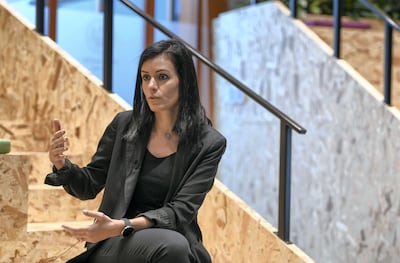Two UAE developers have signed up to new AI safety standards that aim to stop the technology from taking a dangerous turn.
Abu Dhabi's Technology Innovation Institute and the Microsoft-backed G42 are among 16 names on the "best practice" safety pledge.
They list includes Microsoft, Google, Meta, Amazon and OpenAI – the company behind ChatGPT – as well as Chinese companies.
Announced at an AI summit hosted by the UK and South Korea, an event that opened on Tuesday in Seoul, the pledge commits developers to setting out which risks would be "deemed intolerable".
The signatories have also agreed to publish safety guidelines that explain how they will measure risks before a further AI summit in France next year. They also said they would commit to "not develop or deploy a model or system at all" if the risks cannot be minimised.
Najwa Aaraj, chief executive of the institute, said the Abu Dhabi developer was a "firm believer" in trusted and secure AI.
The institute – which is behind the UAE's Falcon language model – is committed to making its models open-source, she said.
"The power of generative AI and large language models is already transforming industries but for us to reap the maximum benefit we must keep trustworthiness and safety at the core of the technology’s development," Dr Aaraj added.

G42, an Abu Dhabi AI and cloud computing company, is also backing the pledge. The company last month received a $1.5 billion investment from Microsoft in a partnership that aims to boost the Middle East's talent pool of developers.
Transparency push
UK Prime Minister Rishi Sunak said the commitments "ensure the world’s leading AI companies will provide transparency and accountability".
"It’s a world first to have so many leading AI companies from so many different parts of the globe all agreeing to the same commitments on AI safety," he said.
"It sets a precedent for global standards on AI safety that will unlock the benefits of this transformative technology."

South Korean Science Minister Lee Jong-ho said the safety pledge should "establish itself as a best practice in the global AI industry ecosystem".
Britain is positioning itself as a leader in AI policy and hosted a first high-level summit on the subject at code-breaking centre Bletchley Park last year.
A panel of scientists was set up to assess AI safety risks in a role similar to the UN's top climate science panel, the IPCC.
Mr Sunak has warned AI could usher in the spread of chemical and biological weapons, terrorism, child abuse and out-of-control machines "if we get this wrong".
The US has launched its own AI safety institute to address fears of "profound harm", a move outlined by Vice President Kamala Harris in a speech in London last year.
In another US-led initiative, dozens of countries including the UK, France and Morocco, have committed to the responsible use of AI in the military, including autonomous weapons.


